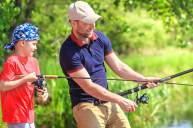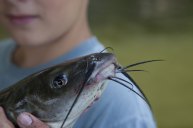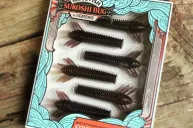There is a ton of information available online to help you start fishing. Some guides show you everything from buying a rod to setting up your fishing rig to finding a fishing hole while others linger on minute details like how to catch a bass. While it's all helpful, it can also be overwhelming. That's why we put the main points into one readable package. Here are some quick fishing tips to prepare you for your first trip.
1. Rely on locals
One of the best pieces of advice we can share is if you're unsure about something, ask for help. You can ask for help from the local tackle shop, park rangers, or even other fishermen. They will know more about the fishing spots in the area as well as regulations, species of fish, bait, and any other details you'd need to know than most websites.
Also, if you've never fished before or barely ever fish, there's no shame in it. Fishing doesn't have to be about catching a fish, per se, but rather, enjoying the process. One of the most commonly cited reasons people go fishing is to reduce stress by going through the motions and enjoying nature. That's why we suggest asking for help. And more often than not, people are happy to oblige, especially when it comes to sharing a sport that they love.
2. Fishing etiquette
While you're fishing, there are written and unwritten rules to follow so everyone has fun and stays safe. Fortunately, fishing etiquette rules are all fairly intuitive, especially when it comes to using a shared space. These include things like giving other anglers space and keeping the area clean. Think about it. In most situations, it's considered rude and disrespectful to cause disruptions.
Yet, some rules might not be as intuitive, especially if you're out on a boat. You should try to let the water rest, meaning settle down, and give fishermen in the water the right of way. And if you're not in a boat, try not to disrupt the ecosystem by kicking up mud or silt or throwing rocks.

An angler is keeping his catch calm by properly supporting and keeping it partially in the water. Credit: C. Medley/NPS
3. Buy a fishing license
Most states require that you buy a fishing license before casting a line. While the price varies by state, they will cost anywhere from $10 to $50 annually for residents and anywhere from $30 to $200 annually for non-residents. However, you can also buy day passes.
If you don't have a fishing license, the best case scenario is you're told to stop fishing while the worst case is you get a ticket. But the punishment isn't the only reason to buy one. The money raised from fishing license sales goes toward funding a host of conservation and recreational activities.
4. Exercise patience
As we said before, fishing is like most outdoor sports in that it's about the adventure and not the destination. So be patient and manage your expectations. If you want to become a great fisherman, you should fish where the fish are, which sounds obvious, but you won't know where that is unless you try a variety of spots in one area and go through the process. So be patient, try a spot for a little while and if it doesn't work, move on.
5. Know how to handle a fish
Whether you're fishing to eat or planning to catch and release, you need to know how to properly handle a fish and de-hook it. The reason is being caught, handled, and exposed to the air is stressful for the fish, so much so that some actually die of shock.
If you catch and release the fish, you should try to make it as painless as possible for the fish by trying to keep it in the water as much as possible and de-hooking it right away. However, if you plan on eating the fish, that stress can actually ruin the meat and cause it to spoil quicker, so you should handle the fish appropriately and kill it quickly and as painlessly as possible.




